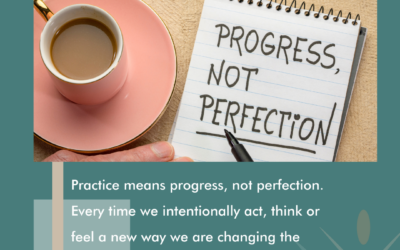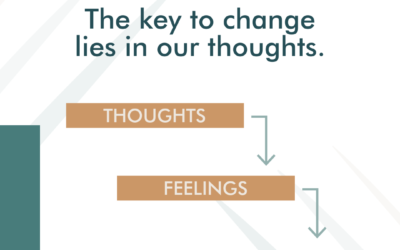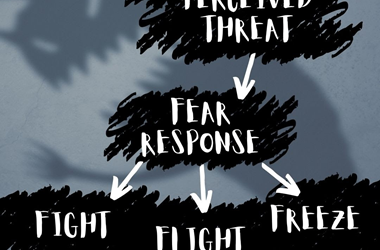3 Steps to Releasing Tension from Trauma-Related Stress and Getting A Good Night’s Rest

Has this ever happened to you? You’re laying in bed and you notice your body and mind can’t relax. You’re tired but can’t sleep. Stressed but the day is already over. It’s time to unwind and sleep but instead, you lie awake, restless and stressed. Thoughts and feelings like worry, anxiety, frustration, and anger are intruding on your sleep time. Your emotional stress from the day becomes your physical stress at night.
Nighttime stress is a real problem.
Not only is your body not able to relax but neither is your mind. The resulting restlessness leaves you sore, tired, and probably cranky in the morning. Instead of waking up to a new day with a sense of renewal, you wake up still stressed and not looking forward to the day. This is a vicious cycle that leaves us vulnerable to reacting to our triggers throughout the day with our children. We show up short-tempered, irritated, and quick to say no. We focus on all the negatives in our child’s behaviors and overlook all the positives. Lack of sleep magnifies our stress levels, enabling us to show up the way we want as a parent. Quality sleep is a must for any parent raising a child who has experienced early childhood trauma!
We all know stress causes tension in our bodies.
 When our kids are in fight or flight mode, we usually end up in fight or flight mode – even if we restrict our reactions and respond “properly” it still can be very stressful to us. When stress is a part of everyday life, our body doesn’t have a chance to relax. Our constant muscle tension tells our brain to be alert, there is danger up ahead. This vicious cycle keeps our bodies from eliciting the relaxation response – a natural phenomenon that is supposed to happen when we go to bed.
When our kids are in fight or flight mode, we usually end up in fight or flight mode – even if we restrict our reactions and respond “properly” it still can be very stressful to us. When stress is a part of everyday life, our body doesn’t have a chance to relax. Our constant muscle tension tells our brain to be alert, there is danger up ahead. This vicious cycle keeps our bodies from eliciting the relaxation response – a natural phenomenon that is supposed to happen when we go to bed.
Last night, I realized my entire body was tense even though I was laying down in bed doing nothing. My teeth were clenched, my shoulders were tight, my neck was so tight my head wasn’t even relaxed into my pillow! Not only did my muscles seem stuck “on”, but my thoughts were also stuck “on”. They were spinning on conversations and stressful situations from earlier in the day. I was unintentionally ruminating in my head – coming up with new ways I could’ve responded, ways things could’ve been worse, ways things could’ve been better. My body’s stress response was stuck “on”. Luckily, I’ve learned a few key steps to purposefully turn on my body’s relaxation response. Let me share them with you so that you can find the rest you need to recover from today’s stressors.
Step 1 Notice the thoughts in your mind.

Change starts with awareness. Notice, without judgment, that your thoughts are too active. They need to slow down. Acknowledge the tension and hurt from the day without replaying the circumstances. This is not the time to analyze the day’s events. Just observe that your brain has been racing. Instead of focusing on the circumstances of the day, pay attention to the emotional feelings. Recognize that the day’s unprocessed emotions are the cause of physical tension.
Ask yourself where in your body are you holding on to these emotions?
Step 2 Explore the sensations in your body.

Slowly, shift your focus from your emotional feelings to their physical sensations in your body. Explore where these tense feelings are in the body.
Ask yourself: Is my face tight, how do my eyes, jaw, and tongue feel? What about my shoulders, neck, and head?
Step 3 – Consciously focus on relaxing each muscle.

Imagine each muscle being really heavy and melting into the mattress. I imagine my head is heavy like a bowling ball, it’s so heavy it sinks into my pillow. My eyes are so heavy I envision them settling to the back of my skull. I picture my upper legs loosening from my hip joints. My legs become heavy and weighted. Do this for every area of your body. Start at your toes and intentionally feel the heaviness of each body part as you slowly work your way up. If you still are having trouble relaxing, try tightening each muscle, one at a time, as tight as you can for 10 seconds. Then focus on relaxing it. This technique has a name, Progressive Muscle Relaxation.
Decreasing muscle tension will activate the relaxation response in your body and help decrease your sense of anxiety, stress, and general overwhelm. With practice, your body will get into a state of relaxation quicker. If your mind starts to wander back to the day’s circumstances, you’ll notice your body will tense up again. Gently guide your mind back to the places in your body that need to relax. Focus your thoughts on those muscles, repeating the 3 steps. You may have to do this several times a night. You are teaching your body what it feels like to relax. With practice, you will find you can intentionally relax your body and mind and sleep will follow purposefully.
Learning to relax your body and release the tension is vital to your mental well-being.
Raising a child with challenging behaviors is stressful and getting a good night’s sleep is necessary. With practice, you can train your body to release this tension, let go of the day’s stress and fall asleep. I have found these 3 steps to be extremely helpful. I hope you do too!




0 Comments